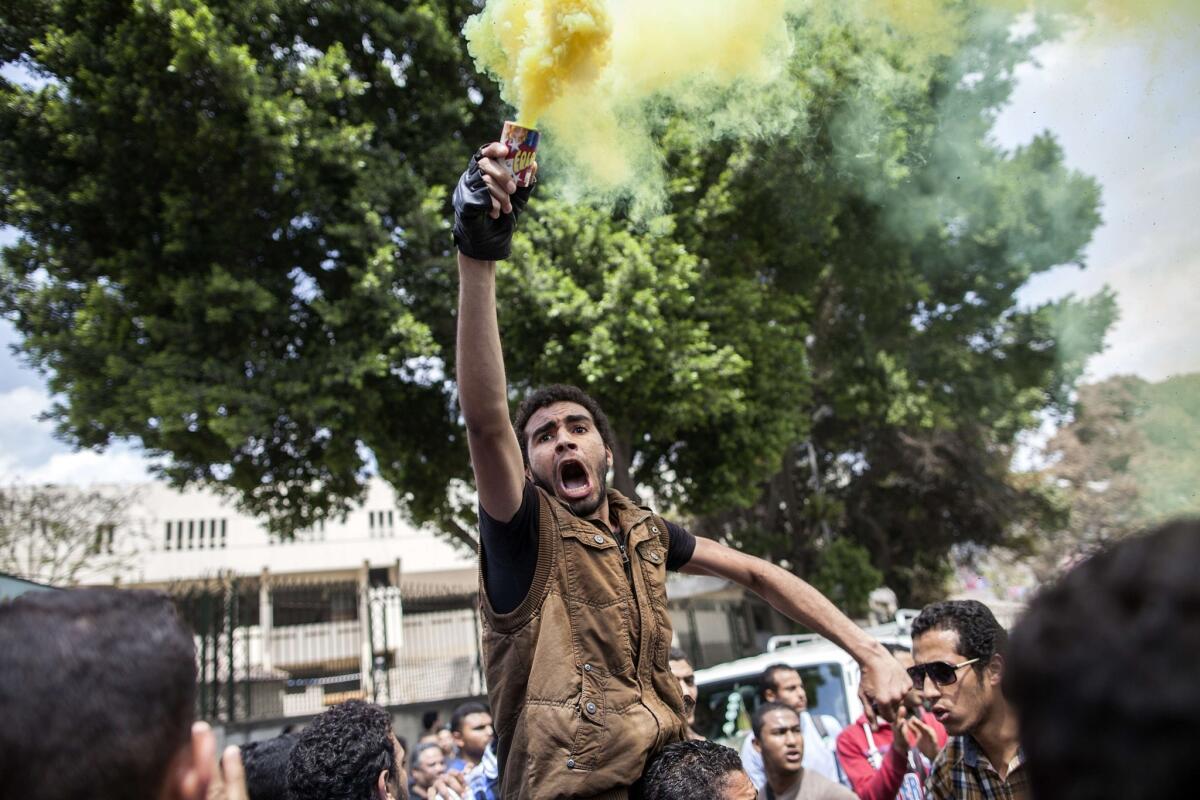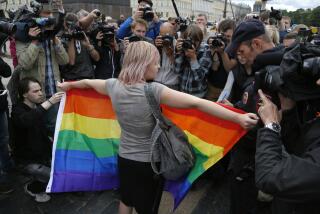Egypt brushes aside criticism of latest anti-terror measures

- Share via
CAIRO — Egypt on Saturday sharply rejected a prominent human rights group’s criticism of two tough new draft anti-terror laws.
The measures, which have yet to be signed into law by interim President Adly Mansour, so sweepingly define terrorism that almost any sort of political activism, however peaceful, could result in prosecution, Amnesty International said in a statement issued Friday.
Foreign Ministry spokesman Badr Abdelatty dismissed the London-based group’s criticism, characterizing it as meddling in Egypt’s affairs.
“The Egyptian government is only accountable to the Egyptian people,” he said. “Any democratic country takes measures to provide safety and security for its people.”
The legislation, approved earlier this month by the Cabinet, contains clauses that designate “damaging national unity, natural resources [and] monuments,” as acts of terror. Hindering the work of Egyptian judicial bodies or diplomats, together with doing damage to Egypt’s communications systems or the economy, also come under the terrorism umbrella.
Amnesty International argued that such a broad-brush approach could be used to stifle freedom of expression and muzzle dissent — criticisms that have already been leveled for months at the military-backed government, which took over in early July.
“These deeply flawed draft laws can be abused because they include an increasingly broad and vague definition of terrorism,” said Amnesty’s deputy director for the Middle East and North Africa, Hassiba Hadj Sahraoui. The group urged Egypt to amend or scrap the measures.
Abdelatty, the foreign ministry spokesman, said a recent wave of violence attributed to Islamic militants justified stronger steps by the government. Hundreds of Egyptian police and soldiers have been killed in attacks over the last nine months, many of them in the restive Sinai Peninsula, but also in heartland towns and cities, including Cairo.
The militant group Ansar Bayt al Maqdis, or Partisans of Jerusalem, has claimed responsibility for a number of the most lethal and sophisticated strikes. But Egyptian authorities consistently blame the Muslim Brotherhood, the movement of ousted Islamist President Mohamed Morsi, for being behind the attacks.
The Obama administration on Wednesday declared Ansar a terrorist group, a step it has declined to take regarding the Brotherhood, Egypt’s oldest and largest Islamist movement. Egyptian officials say Ansar and the Brotherhood act in concert, but have offered no proof of ongoing large-scale cooperation.
The Brotherhood was branded a terror group by Egyptian authorities in December of last year. In the wake of the popularly supported coup that toppled Morsi, an estimated 1,400 of his backers have been killed in street protests and about 16,000 others are incarcerated, according to Egypt’s own official estimates. The group is formally banned, and authorities have moved to seize its assets.
Morsi himself is on trial on a variety of charges, several of them capital offenses, and is due back in court next week. As recently as a few days ago the Brotherhood issued a statement saying it renounced violence, but Egyptian authorities have scoffed at that assertion.
The wide-ranging government crackdown on Islamist groups has extended to some secular opponents of the interim government as well. Many of the prosecutions center on violations of an anti-protest law enacted last year, which in effect outlawed unsanctioned street demonstrations.
Even without the proposed new anti-terror laws, Egyptian authorities have aggressively pursued terror-related charges against some unlikely defendants. Those include three journalists for the Qatar-based news channel Al Jazeera English, who have been imprisoned for more than three months accused of supporting the Brotherhood by disseminating “false news.”
The journalists deny the charges, which they call politicized, and prosecutors so far have presented no evidence to support the accusations. Previous court sessions have included prosecutors and investigators displaying ordinary newsgathering equipment such as microphones and cameras, or showing the court seized footage including animal videos and family gatherings.
Twitter: @laurakingLAT
More to Read
Sign up for Essential California
The most important California stories and recommendations in your inbox every morning.
You may occasionally receive promotional content from the Los Angeles Times.












